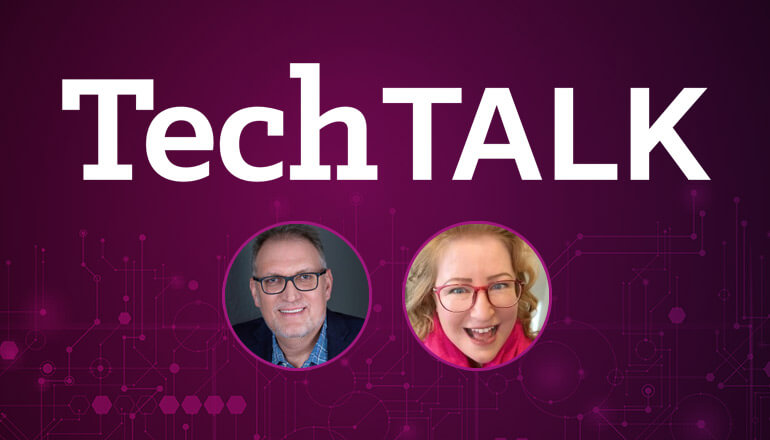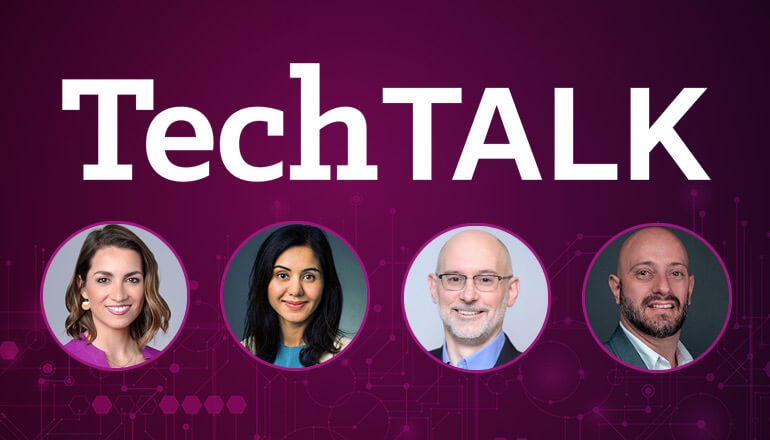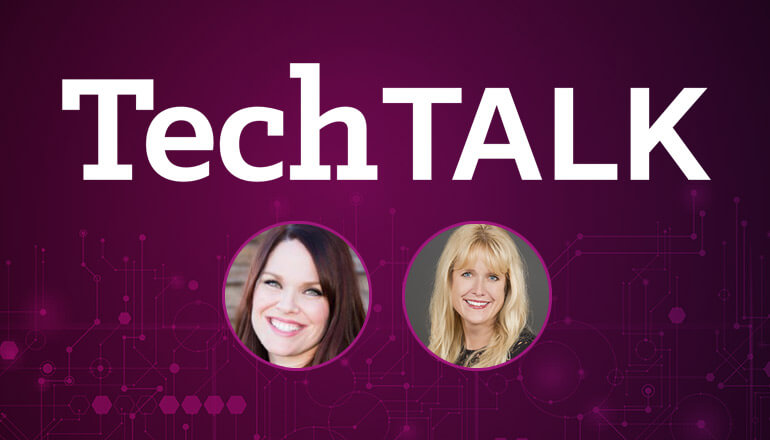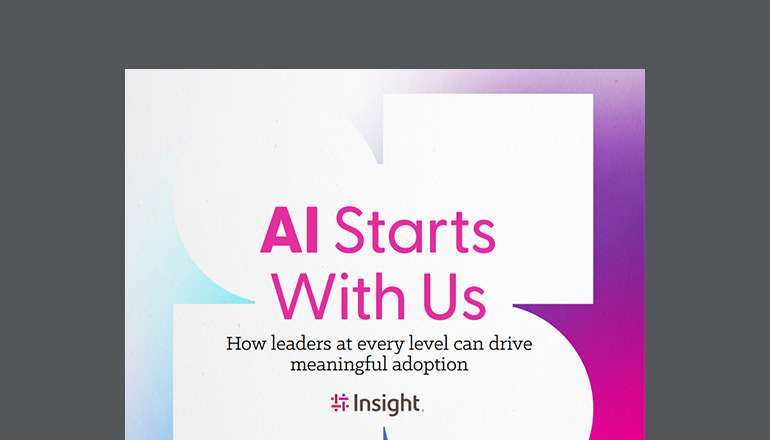Audio transcript:
Why Digital Acceleration Is the New Business Imperative
Published December 29, 2020
JEFF
Hello, thanks for joining us on Insight TechTalk. I'm Jeff Dodge, Director, Digital Innovation, Go-To-Market. I'm joined today by Xochitl Monteon, Intel IT, VP and GM Global Supply Chain and Chief Privacy Officer.
Welcome Xochitl.
XOCHITL
Hi, welcome. Nice to be here. Thank you so much, Jeff. I'm so delighted to discuss this topic today.
Intel is a highly influential and impactful player when it comes to innovation. And companies understand the need for transformation, but this year, as you know, has proven to be, quite challenging with all industries undergoing tremendous transformation efforts. And really the dialogue this year is not so much about digital transformation, rather digital acceleration.
JEFF
That's really exactly what we've experienced here at Insight as well. So happy to have you here, really. Can you explain the shift that you just talked about, the shift in focus from digital transformation to digital acceleration?
XOCHITL
Yeah, absolutely.
JEFF
Is it more than just COVID-19? Is it, is there more going on there than just the pandemic?
XOCHITL
Yeah, absolutely. So, as we think at transformation, from a transformation perspective, really fundamentally, it's the change to an organization's day-to-day business process, right? You think of products, services that a company produces and how it delivers them. And it's really a broader longer-term strategy to adopt new technologies.
When we look at acceleration on the other hand, it's really focused on rapidly modernizing to compete and grow. So, as we look at acceleration, it's really more about agile and enabling companies to see value faster at regular intervals.
So, if we reflect back on 2020, and boy it's been a year, really COVID has been an accelerator from an IT perspective. And for many businesses, what we've seen is that really the crisis has exposed how continuity of operations, critically depends on digital capabilities. It has changed, you know, the world, right? The way we operate, the way businesses operate, the way employees operate, and it's really caused businesses to stop and reflect to really assess how do we stay relevant for customers. And in that space...
JEFF
S...
XOCHITL
Yes, go ahead.
JEFF
No, I was going to say there's so much to unpack there. That's a really insightful and hits exactly what we've experienced as well in our business. We talk a lot about digital innovation being the key to helping clients be disruptors in their own industry. And the irony of 2020 is that this year became the disruptor itself. Some organizations may have been on the right track, going down that digital transformation journey already, others had to really pivot, it was forced upon them, right? So, others put those initiatives on pause.
How did COVID-19 impact transformation at Intel specifically?
XOCHITL
Yeah, so I would say within Intel, we were already well on our journey towards digital transformation. So, for Intel, it was really optimizing to a new normal. So, programs such as workplace of the future, really cloud migration, and really focusing on enabling, further remote work processes. I would say in other areas as we look at other companies or other peers, it's been really shifting to redefine what are the overall priorities from an organization perspective, and really defining and creating different ways to collaborate, right? Really making those very difficult choices between resiliency and capacity, as many companies had to burst to cloud solutions.
Another dynamic has been, how do you shift to managing cybersecurity from the edge to the home. And then how do you, while you're doing all of that, digitally accelerate transformation during, you know, during a pandemic, and respond to both employees needs as well as customer needs and ensure that you deliver your products.
You know, I do believe that at the end of all of this, there will be a point of pause where we can reflect and where most companies will really put a greater focus on resiliency by accelerating their digital transformation to help with really future unanticipated events. As we look at 2020, it truly has been, I would say a whirlwind. And I think it's also been amazing in terms of it not only being an accelerator, but also a disruptor. If we look at the changes throughout the course of 2020, it's shifted all of that. It's really forced us all to change pretty dramatically across all industries.
You know, a great example of this is telemedicine. So, think of how many years it would have taken to virtually go to the doctor's office. That overall user experience, and then think of data. All of that data is now being stored and analyzed digitally, where you have a play there for greater information. So, although it's been difficult, it's been an accelerator to our... You know, from digital transformation to digital acceleration. We've also seen some real creativity, as it being a disruptor to technology.
JEFF
You know, it's interesting, you touched on telemedicine, but I think that's something we can all identify with. You know, just the other day, my mother was saying that she was having a telemedicine appointment with, you know, pretty leading up to a routine surgery, but she never would have considered that just, you know, just a year ago. So that's really insightful. I'm curious, how do you see the role of the CEO in that transformation? How can a CEO empower and accelerate transformation to maximize success?
XOCHITL
Right. So it has to be an absolute strong partnership between the CIO and the CEO. It's absolutely critical to accelerating the transformation. There has to be absolute transparency, between the two, and there also needs to be an understanding and acknowledgement and appetite for really how much a CIO wants to take on in terms of change. It has to be with commitment from the top, because as we look at a digital acceleration, really the CEO needs to see the business transformation as their top two to three priorities for the company. And there needs to be full support with personal involvement. There has to be absolute clarity, right? The basics, the who, the what, the why, the how, in terms of focusing on very specific metrics, very specific deliverables. And it has to be very intentional, right? It can't be, you know, the, the project of the year, it's a multi-year investment, multi-year project for the types of initiatives that really drive a transformation of culture, transformation of process and technology with a focus on the employees, the way the organization works. There needs to be a consistent drum beat, dialogue, and reinforcement process to make it stick.
JEFF
Yeah, that's really well put, and we see that all the time. It really takes that digital champion, and it has to come from the top, I couldn't agree more. Sometimes it's easier said than done though, right?
XOCHITL
Oh, absolutely. And I think, you know, as we look at what makes it successful, I think they're really three key components.
First and foremost, you need to enlist your best people in the process. And these are individuals both from the business and from IT that are influencers, and I would say change masters.
And second is that commitment of purpose, right? So, this is not an initiative digital, right? There needs to be commitment for the long haul. Transformation is not a sprint, it's a marathon. So, commitment, resources need to be there throughout the journey.
And finally, like I said, change management. I can't emphasize this enough. When the company is making changes to culture, or policy, or things that are deeply rooted, a portion of the population is going to get stuck. So there needs to be a process, a methodology, resources that are focused on change management as a key to help unfreeze people and really allow them to embrace that change.
JEFF
Yeah, we see change management as an incredibly important component of all of these digital initiatives. Maybe we just have a minute left, maybe if you could just touch on how AI has become a critical... Become critical and accelerated because of this global pandemic.
XOCHITL
Yeah, absolutely. And I think, you know, the one item that we hit on, we'll just go back to telemedicine. So, if we look at how that's been leveraged in any overall environment. Using it, and I know we've used it at Intel, as a means to really focus on optimizing the overall user experience. So, like I said, we're well on our way through our digital transformation. We pivot to digital acceleration. We were able to deploy AI on a lot of the data that we already had in place. We've spent the last decade or so, really establishing a very solid data foundation. Now we can optimize that to proactively leverage telemetry and AI to identify where might we have an issue, so we could optimize it over a user experience, experience for employees that are working from home, to make it feel as though they're actually working in the office, improve performance, improve productivity, and just the overall user experience for our workforce.
JEFF
Yeah, and the user experience is critical. Couldn't agree more. Well, listen, thank you so much for your insights today, Xochitl. I really appreciate it. It's been wonderful spending this time with you. And for everyone else out there in the audience, you can learn more from Xochitl and Intel's approach to transformation and AI in her blog on insight.com.
XOCHITL
Great, thank you so much.
JEFF
Thank you so much Xochitl.
XOCHITL
Thank you.
[Music]









